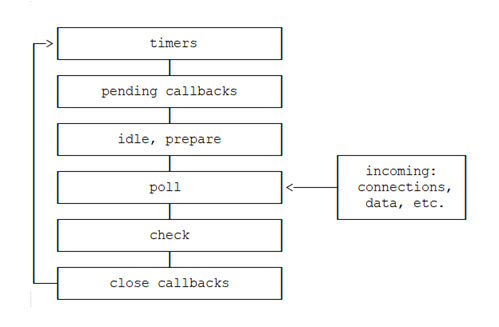
- Node.js - Home
- Node.js - Introduction
- Node.js - Environment Setup
- Node.js - First Application
- Node.js - REPL Terminal
- Node.js - Command Line Options
- Node.js - Package Manager (NPM)
- Node.js - Callbacks Concept
- Node.js - Upload Files
- Node.js - Send an Email
- Node.js - Events
- Node.js - Event Loop
- Node.js - Event Emitter
- Node.js - Debugger
- Node.js - Global Objects
- Node.js - Console
- Node.js - Process
- Node.js - Scaling Application
- Node.js - Packaging
- Node.js - Express Framework
- Node.js - RESTFul API
- Node.js - Buffers
- Node.js - Streams
- Node.js - File System
- Node.js MySQL
- Node.js - MySQL Get Started
- Node.js - MySQL Create Database
- Node.js - MySQL Create Table
- Node.js - MySQL Insert Into
- Node.js - MySQL Select From
- Node.js - MySQL Where
- Node.js - MySQL Order By
- Node.js - MySQL Delete
- Node.js - MySQL Update
- Node.js - MySQL Join
- Node.js MongoDB
- Node.js - MongoDB Get Started
- Node.js - MongoDB Create Database
- Node.js - MongoDB Create Collection
- Node.js - MongoDB Insert
- Node.js - MongoDB Find
- Node.js - MongoDB Query
- Node.js - MongoDB Sort
- Node.js - MongoDB Delete
- Node.js - MongoDB Update
- Node.js - MongoDB Limit
- Node.js - MongoDB Join
- Node.js Modules
- Node.js - Modules
- Node.js - Built-in Modules
- Node.js - Utility Modules
- Node.js - Web Module
Node.js - Event Loop
Even though JavaScript is single threaded, Node.js employs event loop to perform asynchronous non-blocking I/O operations, by delegating the operations to the system kernel whenever possible. Most modern OS kernels are multi-threaded, capable of handling multiple operations by executing them in the background. When the current operation is completed, the kernel informs Node.js so that the appropriate callback may be added to the poll queue to eventually be executed.
The event loop is initialized as soon as Node.js starts, either by providing a .js script or in REPL mode. The order of operations of the event loop are shown in the figure below −

The Timers phase executes callbacks scheduled by setTimeout() and setInterval().
The pending callbacks phase executes I/O callbacks deferred to the next loop iteration.
The poll phase has two main functions: (a) calculating how long it should block and poll for I/O, and (b) processing events in the poll queue. Node.js retrieves new I/O events and executes I/O related callbacks in this phase.
The check phase executes the callbacks immediately after the poll phase has completed. If the poll phase becomes idle and scripts have been queued with setImmediate() timer. The event loop continues to the check phase rather than waiting. The libuv library is a part of Node.js runtime, playing the role of providing support for handling asynchronous operations.

The V8 engine handles the execution of JavaScript code, whereas the Libuv library utilizes the native mechanism of the respective operating system to hanle asynchronous operations.
Finally, the close callbacks phase handles the callbacks registered with close event such as socket.on(close, function). The close event will be emitted if the socket is closed abruptly, otherwise it will be emitted by process.nextTick() method to defer the execution of a function until the next iteration of the event loop.
Before beginning the next run of the event loop, Node.js checks if it is waiting for any asynchronous I/O or timers. If there arent any, the runtime shuts down cleanly.
Understanding how the event loop works is essential for building scalable Node.js applications. The event loop is a fundamental part of Node.js that enables asynchronous programming by ensuring the main thread is not blocked.